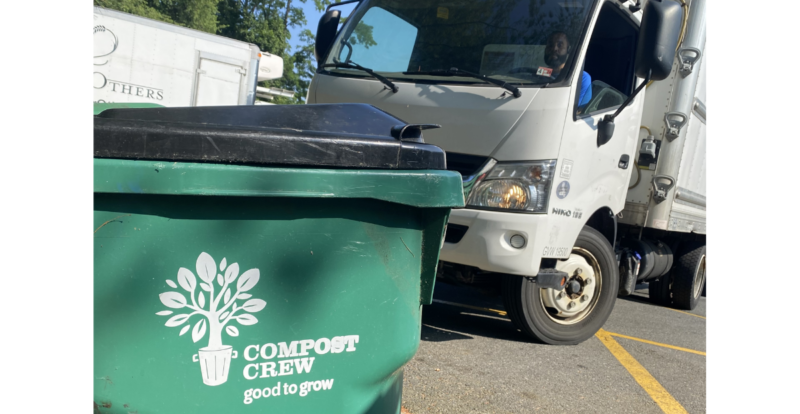As we jump into Farmers Market season, pursuing the vendors of ripe strawberries, leafy greens, and fresh bread may come to mind. Farmers Markets are an amazing setting to find fresh, local produce and, due to Fairfax County expanding their 2022 initiative, somewhere to drop off your compost!
Composting is the process of naturally recycling organic matter for it to be repurposed into fertilizer for plants. Most often the recycled organic matter are food scraps, but there are some surprising items like eggshells and paper towels that can be included in your compost pile.
We had the opportunity to sit down with Compost Crew, a Rockville based organization who serves the DMV and picks up FFO’s food scraps. Compost Crew’s services included collecting and hauling food scraps from local business, maintaining food scrap collection bins, and, in a new initiative, residential curbside food scrap pick-up in Alexandria city. Compost Crew gave us some tips and recommendations for those starting out composting!
Composting has a plethora of benefits. According to Dan Isreal, the Senior VP, Sales & Marketing, shared that that the DC area generates roughly 700,000 lbs. of food waste every year. Composting is a way to reduce the amount of waste that goes into landfills. Food put in the trash ends up in landfills, and environment where organic waste cannot properly decompose due to the lack of oxygen. Instead, the food scraps will rot and produce methane, a harmful greenhouse gas.
In addition to preventing excessive food waste, composting is beneficial for your plants. Adding compost to plants increases their ability to combat certain pests and diseases, balances the pH levels in your soil, and increases their ability to retain water. Many gardeners refer to compost as “black gold” because of its value to plant health.
Now that we’ve gone over the basics of what compost is, how do you start composting? There are two main ways in which you can compost, either create your compost at home or drop off your food scraps at a compost collection location.
Composting at Home:
The first step is going to be ensuring you have two containers – one to collect your food scraps in the kitchen, and the other to create your compost. Dan Isreal shared, “Separating out your food scraps is quite easy. It helps to have a system — like a small bin in your kitchen that’s near where you generate the food scraps. Empty that daily or every other day into your larger bin. Freezing food scraps can help minimize odors, especially in the hot DC-area summers. You’ll soon notice that you don’t have to take your trash out as frequently.”
There are lots of resources if you want to get started composting at home. Once you have your food scraps, it’s time to start creating your compost pile. Composting requires nitrogen, carbon, oxygen, and water – the quantities of each can vary depending on your location. Check out this resource from the Virginia Cooperative Extension that outlines specifics on the ratio needed for successful compost.
Once you’ve created your compost pile, you will need to consistently turn it in order for all parts of the pile to receive equal treatment. This can be done using a spade and moving around the compost pile. Then, in a few months, you will have ready to use compost!
Dropping off your food scraps:
Alternatively, you can collect your food scraps and take them to a drop off location, like the ones Compost Crew and Fairfax County Farmers Markets offer. As of 2023, all Fairfax County Farmers Markets have a designated compost drop off space. Organizations like Compost Crew then allow members the opportunity to pick up the compost created using the food scraps. Last year Compost Crew distributed over 100 tons of compost!
Now that you know the basics of composting, you’re ready to get started! Fairfax County has produced these helpful resources to help guide people on items to compost, versus what can’t be added. Be mindful that as you move, or your county changes, some of the compostable items will also change. Always find your specific district’s composting guidelines!
Sources:
Fairfaxcounty.gov
Compostcrew.com
Compostingcouncil.org


